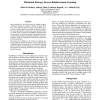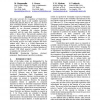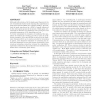509 search results - page 29 / 102 » Compositional Models for Reinforcement Learning |
126
click to vote
AAAI
2008
15 years 4 months ago
2008
Recent research has shown the benefit of framing problems of imitation learning as solutions to Markov Decision Problems. This approach reduces learning to the problem of recoveri...
98
Voted
AAAI
2008
15 years 4 months ago
2008
Potential-based shaping was designed as a way of introducing background knowledge into model-free reinforcement-learning algorithms. By identifying states that are likely to have ...
176
Voted
ABIALS
2008
Springer
15 years 4 months ago
2008
Springer
Abstract. In order to establish autonomous behavior for technical systems, the well known trade-off between reactive control and deliberative planning has to be considered. Within ...
114
click to vote
ITNG
2007
IEEE
15 years 8 months ago
2007
IEEE
This paper presents the recognition of Handwritten Hindi Numerals based on the modified exponential membership function fitted to the fuzzy sets derived from normalized distance f...
125
click to vote
ATAL
2003
Springer
15 years 7 months ago
2003
Springer
Although well understood in the single-agent framework, the use of traditional reinforcement learning (RL) algorithms in multi-agent systems (MAS) is not always justified. The fe...



